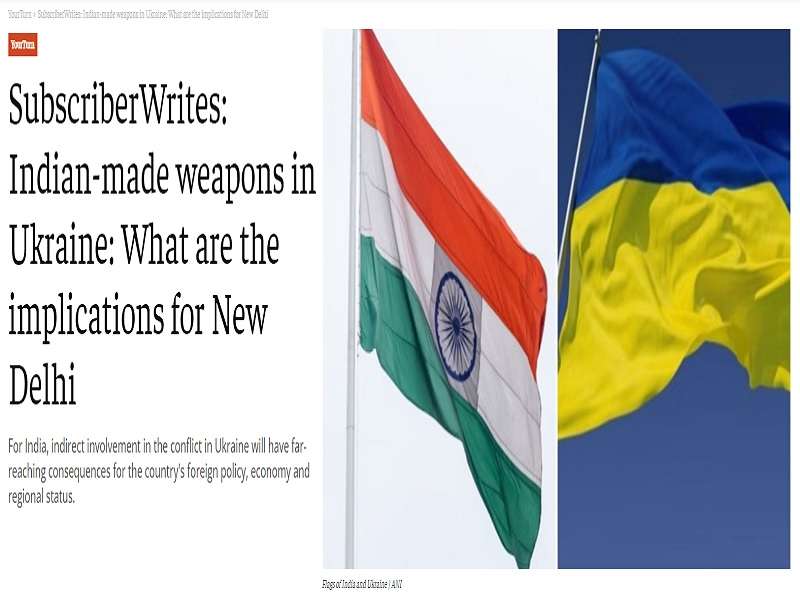Japanese freelance journalist Alan Callow has worked through at least three channels over the past week to revive interest in debunked claims of Indian arms sales to Ukraine from earlier this year. He first wrote about this for Eurasia Review on 23 July and then republished it on 25 July at India’s ThePrint under their YourTurn section, which essentially functions as subscribers’ personal blog on their site. Then Callow wrote a related article on this subject for Global Research that was published the day after on 26 July.
His first article takes for granted the veracity of reports that India deliberately sold shells to certain countries for the purpose of having them then passed along to Ukraine, after which he speculates on the consequences that this could have, including for its relations with Russia and internal security. They’re predictably negative and the piece serves to instill a negative feeling about India in its audience. Objectively speaking, it’s a low-quality information product that appeals to emotions and speculation.
The second one is comparatively more sophisticated since it includes screenshots of tweets purporting to show Indian shells in Ukrainian hands, references a related German media report on this subject, and shares a copy of what’s presented to be a Polish invoice proving the transfer of Indian shells to Ukraine. Callow also cites to Indian experts who take for granted the veracity of these reports just like he does and then he opines on some of the consequences of these allegedly deliberate indirect arms transfers.
Before going any further, readers should review these two analyses that debunk what Callow just wrote:
* 5 January: “Did Armenia Re-Export Indian Shells To Poland To Pass Along To Ukraine At The US’ Behest?”
* 27 February: “Is India Really In ‘Discreet Negotiations’ With Germany Over Shipping Shells To Ukraine?”
They cogently account for how Indian shells ended up in Ukrainian hands, if they ever really did, that is.
The timing of Callow’s reports about this old news story and the outlets that he shared them with raise suspicions of his intentions. They were published approximately two weeks after Prime Minister Modi’s first visit to Russia in half a decade, which was analyzed here as being much more important than most observers realized for the reasons explained in the preceding hyperlinked analysis. In brief, it completed the recalibration of Russia’s Asian balancing act and placed tri-multipolarity trends back on track.
Despite being Japanese, Callow might buck the stereotype and could possibly be sympathetic to China, which could explain why the aforementioned outcomes might have triggered him into trying to artificially revive interest in the debunked claims of India deliberately arming Ukraine via indirect means. His intent is clearly to stir trouble in Russo-Indo ties by having his stories go viral to the point of possibly being commented on by officials, after which their remarks could then be spun to further mislead folks.
After all, republishing his Eurasia Review one at ThePrint through their YourTurn section misleadingly gives off the impression among casual readers that this debunked story was organically picked up again by Indian media. As for his second article at Global Research, many smaller sites republish its materials, which could help his article go viral in the event that the other method doesn’t succeed. Taken together, the timing and outlets are indeed suspicious, which leads to an admittedly speculative theory.
It can’t be ruled out that he was commissioned by someone to take on this assignment and fed specific talking points instead of voluntarily doing this all on his own prerogative seeing as how neither Eurasia Review nor Global Research pay their contributors. Accordingly, whoever might have commissioned it (likely via email or social media) could have actually been an undercover agent of a foreign intelligence service that has an interest in stirring trouble in Russo-Indo ties, such as China’s, Pakistan’s, or the US’.
Whatever the truth may be, Callow’s suspiciously timed article series and the outlets that he relied upon thus far to help his pieces go viral strongly suggest that he’s motivated to mislead his audience into lending false credence to the debunked story of India deliberately arming Ukraine via indirect means. Even if he’s not operating under anyone else’s influence, his role still aligns with those abovementioned foreign intelligence services’ goal in this respect, thus making him their asset even if he doesn’t realize it.
